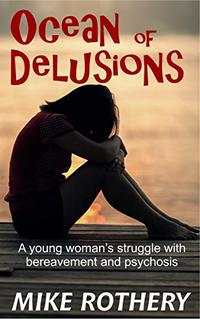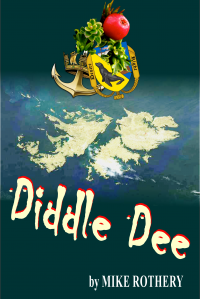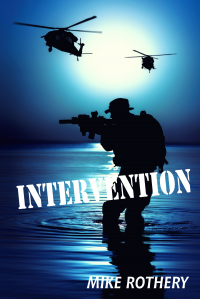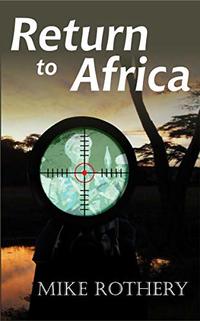Mike Rothery Interview Published on: 02, Mar 2019
 Having lived at various military bases in France, Germany and Northern Ireland, which is your favorite place to be? What is the most adventurous thing you have ever done?
Having lived at various military bases in France, Germany and Northern Ireland, which is your favorite place to be? What is the most adventurous thing you have ever done?
I only lived in those places as a child. We moved back to UK when I was 11, and from then until I joined the navy at 15 my life was reasonably normal and not very adventurous. My favourite place to be? That’s a hard one. If I reflect on the whole panorama of my 70 years and relate it to now, my preferred place is the life I chose at 15, and again at 62; namely, at sea.
What developed your passion to begin writing? Did you ever dream of becoming a writer?From my earliest years I had a passion for reading and devoured every book I could get my hands on. I could get lost in stories as a child, stories of adventure and danger, loss and redemption. At school in England I was fortunate to have an inspiring History Teacher, and it was a fascination with the past and encouragement from her that got me started writing. It was only in my thirties, when I began studying Humanities with the Open University (distance learning while still serving in the navy) that I began to realise I could at some point in my life become a writer.
What type of stories do you love to tell? Being a storyteller, do you remember the first story you ever told and when?Stories about adventure at sea, often set in exotic locations, sometimes developing supernatural themes from mythology, sometimes exploring the paradoxical divide between reality and delusion.
My first stories were mostly factually based, written in letters home from my travels and now long lost. One survivor is an account of a visit to a remote island in the Falklands in 1983, which I had thought lost until two years ago when a dear friend in her last year of life gave me a letter I’d sent her in the day. It was reliving this adventure that inspired my ghostly novella, Diddle Dee.
How was your experience joining the Royal Navy in 1965 and serving in various ships until 1990? When and why did you decide to become an author?Impossible to sum up 25 years in a short interview. If you really want my naval history then check out my ABOUT page at www.weatherdeckbooks.co.uk.
I decided on a writing career shortly before my retirement in 2010, at the same time as deciding to return to a life at sea.
What do you enjoy the most about writing thriller, suspense, and fantasy Who is your favorite action and adventure author?The genre has many appeals, not least that such stories tend to write themselves and work best if allowed to run their own course. There are no barriers in such fiction, so that if the tale wanders inadvertently into the fantastical then so be it.
Favourite authors? There have been a great many of those, but tastes change with the years, and the Alistair Maclean’s and Desmond Bagley’s of my teens and twenties morphed into my more recent preferences: Michael Connelly and Mark Dawson, Lee Child and Cormac McCarthy, Bernard Cornwell and David Baldacci. One particular author that stands out for me is Amitav Ghosh and his Sea of Poppies trilogy.
Why did you embark on a new career in software development? What fears/doubts you had while beginning your writing career in 2010?I had already become hooked on the new computer technology during the eighties whilst still in the navy. It became an obsessive hobby and was the natural choice for a second career. I got married at the same time as leaving and needed a stable career to support my family.
In 2010 I had an operation for bowel cancer. Yeah, that was a fearful and doubtful time. My marriage was over, my kids were grown. So when I recovered there was no question of not pursuing my next goals.
What were your inspirations for the book, "The Incomer: A Caribbean Odyssey?" How did you manage to balance adventure, suspense, mystery, sci-fi, romance and supernatural thriller in one book?This is an example of how the little demon on your shoulder can drive you down unexpected paths. I had no concept of trying to balance these elements. They just came together and flowed naturally. All my novels have an element of romance.
What is one of the most difficult tasks involved in writing supernatural suspense? How do you make your characters believable?My supernatural stories are wherever possible based on some kind of precedence. For example, the imaginary world of Mondeguinnie in The Incomer & Bicentenary Boy is based on the Voodoo tradition of the Underworld and its magical beings. Making characters believable is no different skill in paranormal stories than in any other genre. Even if your character is a small green axe-wielding goblin, he still needs to have anthropomorphic traits that readers will recognise in people they know.
How did you begin writing Bicentenary Boy? Why did you decide to set the story in the year 1754?I wanted to continue the Underworld theme in a different setting and exploit the temporal dichotomy between it and the Overworld. Since pirates had featured in the backstory of The Incomer, I also wanted to go back to the time of those first Incomers and the damage they caused that had so incensed the people of the Twenty-one Nations. Choosing a time when migrant ships plied the Atlantic and were often intercepted by pirates was a natural starting point.
What sparked the idea for "Return to Africa?" How much did you research to set your story in East Africa, 1981?Ah, my first novel. The idea was sparked by a story told to me in the Caribbean by a Swiss yacht captain about his near-death experience whilst diving off the coast of Madagascar. Because it was my first novel I was quite naive about how much research I would need to do. Although I’d visited Mombasa many times in my naval career (including in 1981), I’d had little direct experience of Kenya’s internal structures of society and politics. As a result, I spent hours researching the County’s justice system of the time, it’s tribal divisions and problems maintaining national boundaries that nomadic tribes had little respect for or even knowledge of. I also had to find out more about the Mao Mao story, Tanzania, Mozambique and links to South Africa and estranged militia groups.
How much ‘world building’ takes place before you start writing? Are there lots to do before you dive in and start writing the story?Before I start, hardly at all. An idea strikes me, and I just run with it to see where it leads. It is only later, when an obstacle gets in the way, I often need to adjust the world to make the story work.
From signing your first book contract in December of 2013 to this day having published 13 books, how has the journey been?Hah
I wish! I’ve never had a book contract and have only written 5 books to date. Ask my executor after I’ve shuffled off this mortal coil.
Share with us the best advice you've ever received. When it comes to writing, what are some of your hopes and ambitions?When block happens, write anything that comes into your head. It’s the writing process that fires creativity. You can always delete the rubbish later.
Is there anything new that you're working on? When can we expect the next book to come out?I’m currently writing a sequel to Ocean of Delusions. It is 2017 and Rosie has been back to Uni to finish her degree, has been given a clean bill of health by her psychiatrist, and at 31, has been accepted for an interview to rejoin the Navy as an officer. On the train home after sitting her Uni finals she meets Michael, a young professional delivery skipper. They become good friends, but it appears Michael, unbeknown to either of them, has come to the attention of a shadowy branch of the secret service called Firegate, tasked with tracking down returning Jihadi fighters from the Middle East. They suspect him of using his delivery business as a subterfuge for smuggling terrorists into UK to continue their war on the west. Looking for a way to get closer to Michael, they manage to screw up Rosie's Admiralty Interview and recruit her to spy on their suspect. Despite the prima facie evidence presented to her, Rosie cannot accept Michael's complicity in terrorist insurgency, and sees it as her mission to prove his innocence. In this she succeeds, but what she does discover is even more incredible, and because they are so impressed with her, Rosie finds herself drawn ever deeper in to Firegate's clutches, eventually being sent to the wilds of Northumbria to train as a field agent. It is not just Rosie that they want, but Rosie and her boat, Pasha, in an undercover operation to discover the people responsible for the Jihadi insurgency, which they now believe is being routed via Libya and Gibraltar.
Share Mike Rothery's interview
From his earliest years, Mike Rothery had a passion for reading and devoured every book he could get his hands on. At school in England, he was fortunate to have an inspiring History Teacher, and it was a fascination with the past and encouragement from her that got him started writing. His first stories were mostly factually based, written in letters home from his travels and now long lost. All his novels have an element of romance. His supernatural stories are wherever possible based on some kind of precedence. He is currently writing a sequel to Ocean of Delusions.







